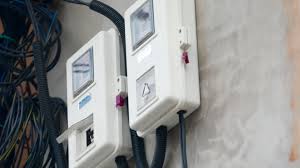The Federal Government, through the Nigerian Electricity Regulatory Commission (NERC) announced that they will be raising the prices of prepaid power meters. This modification has already begun, as it went into effect on the 6th of September, 2023 (a Wednesday).
They made this declaration in a document that was issued officially by the NERC, and it was given the reference number NERC/2023/020. Sanusi Garba, the Chairman of the Commission, and Dafe Akpeneye, the Commissioner Responsible for Legal, Licencing, and Compliance, both put their names on the document.
According to the announcement made by the government, the price of a single-phase metre, which is used to measure the amount of energy used in residences with fewer rooms, has increased to N81,975.16k. When compared to the previous price of N58,661.69k, this one is significantly higher. The cost of a three-phase metre, which is typically seen in larger establishments, is also increasing up. The new price, which is an increase from the previous one of N109,684.36k, is N143,836.10k.
This price hike left a lot of people who use electricity feeling unhappy and frustrated. They demanded an explanation as to why the Nigerian government maintains its policy of raising prices across the board in the energy industry.
Read also: eFactory simplifies electricity payments in Nigeria
Why NERC implemented the increase
On the other hand, the Nigerian Electricity Regulatory Commission provided an explanation for the cause for the price increase of the metres.
They stated that it is for the purpose of ensuring that the prices of metres are fair for both the businesses who provide them and the customers who utilise them. The rise in price will allow these metre companies to generate a decent profit while also covering the costs of acquiring and maintaining metres. This will help these companies meet their expenses.
“Evaluate the affordability of meter services for consumers, aiming to prevent excessive pricing that could burden end-users. Ensure that MAPs are able to provide meters to end-user customers in the prevailing economic realities,” the commission stated.
According to the government, it is of utmost significance to ensure that all households are equipped with electricity metres. This is due to the fact that it assists the nation’s electrical industry in making enough money to continue operating effectively.
Because of these metres, the electric company and the customers who consume power will each receive the necessary amount of money for their services.
“The Meter Asset Provider Scheme is one of the four frameworks in the regulations for the provision of meters to end-use customers in NESI. Section 8(1)(c) of the regulations provides that the costs of single-phase and three-phase meters issued by MAPs, inclusive of all other associated costs of installation and warranties, shall be at the regulated rates approved by the commission.”
“The commission notes that significant changes in macroeconomic indicators, such as inflation and changes in foreign exchange rates, have necessitated a review of the regulated rates for MAP meters,” the NERC stated.
In order to arrive at its decision on the new rates for metres, the government claimed that it had taken into consideration significant data provided by the National Bureau of Statistics and the Central Bank of Nigeria.
They also stated that the cost for the metres that are utilised by the businesses who supply them will remain unchanged. These rates incorporate all of the expenses associated with installing the metres and providing warranties that they will function properly.
The prices that they approved do not include a tax known as the value-added tax; however, they do include the expense of obtaining a specific seal from the Nigerian Electricity Management Services Agency. A single-phase metre will set you back N842.80 for this seal, while a three-phase metre will set you back N1,100.80.
“All MAPs shall adjust their prices to reflect the approved rates. All MAPs shall supply meters previously paid for by end-use customers prior to the commencement of this order at the prevailing rate when payment was made by the customers without additional increase in cost.”
“All Discos and MAPs are to develop and implement customer enlightenment campaigns on the price review, along with a schedule for the implementation of their meter rollout plans. All MAPs shall continue to file monthly sales and meter installation returns with the commission,” NERC said.
Impact on consumers
The price hike for electricity metres was not well received by customers of the utility. They pleaded with the government to reconsider how this will impact the people of Nigeria and make the necessary adjustments.
Uket Obonga, the National Secretary of the Nigeria Electricity Consumer Advocacy Network, remarked: “The government has been talking about this since they changed the foreign exchange rates, but we told them it’s not a good idea because Nigerians are already struggling.”
He added that the rise had placed as a result of pressure that was put on the government by the Metre Asset Providers. Some of these service providers have even stated that they will discontinue providing metres if the cost of the equipment does not decrease.




